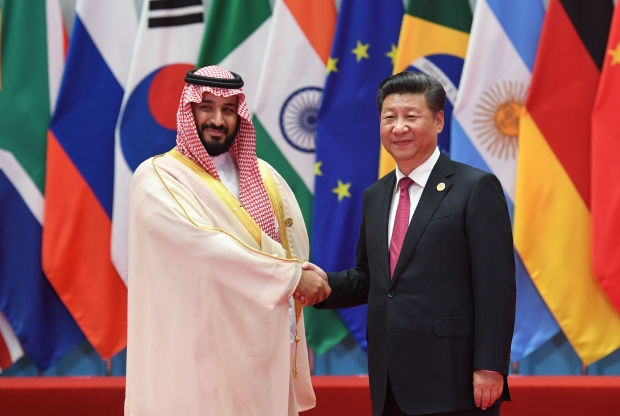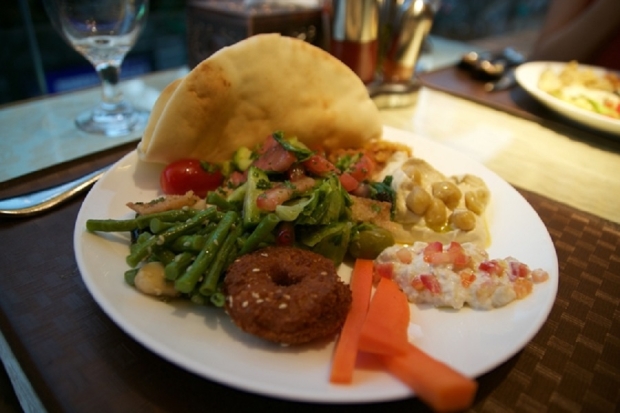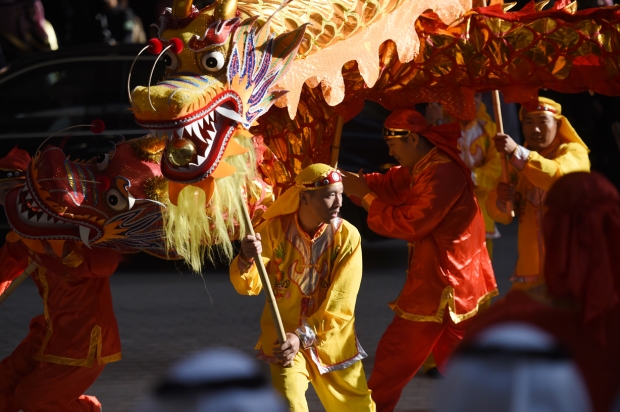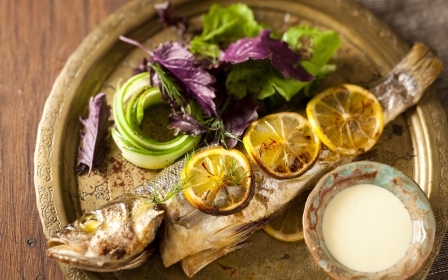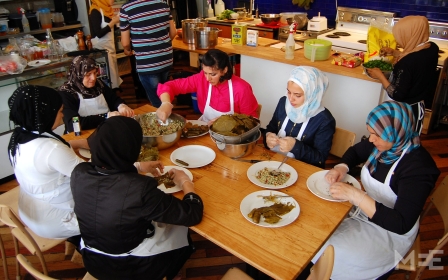Falafel diplomacy: Building China-Middle East relations through food
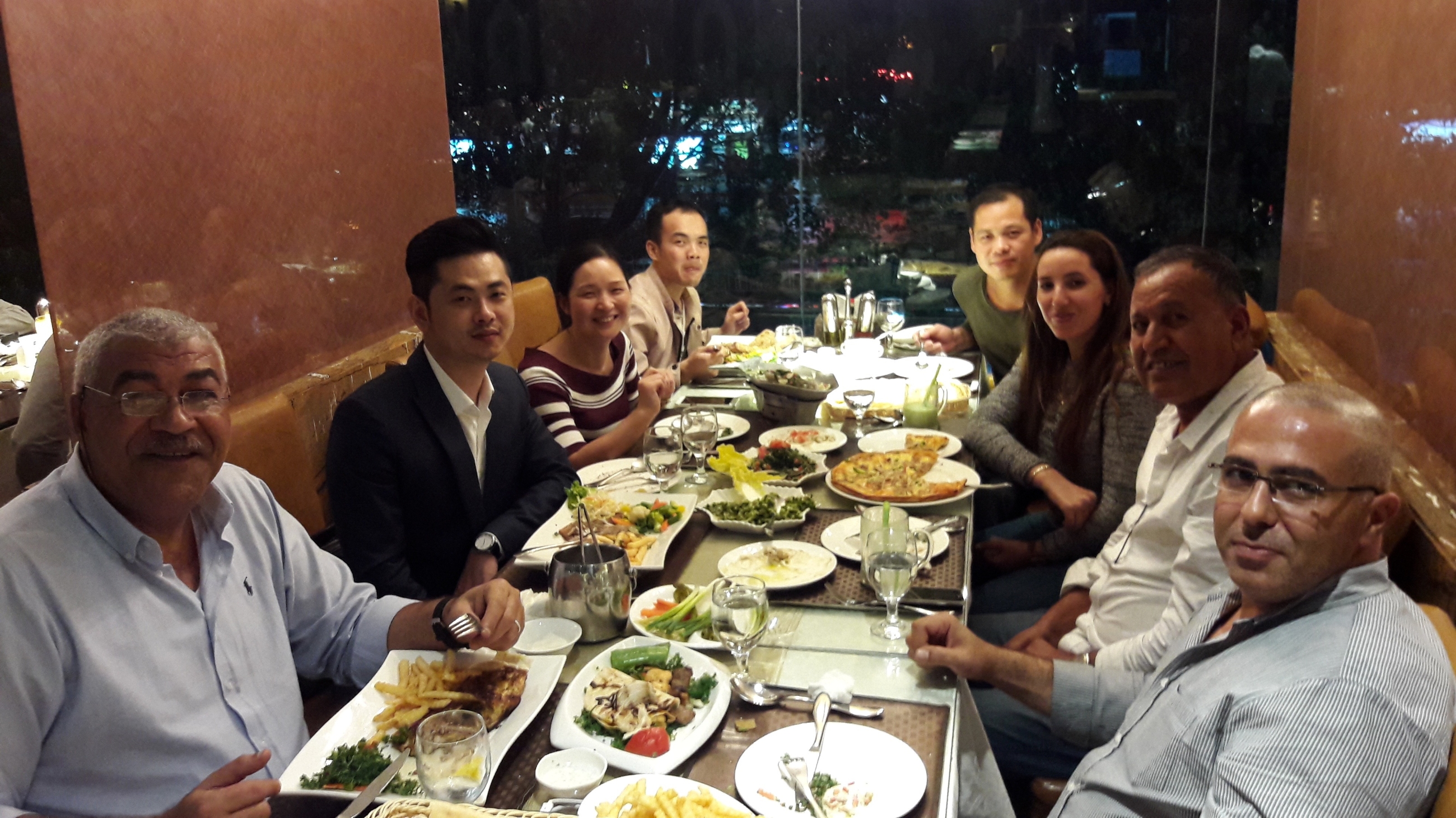
GUANGZHOU, China – Dressed in formal attire, a Syrian doorman greets traders from the Middle East. Flanked by their Chinese hosts, the group climbs the stairs to the dining room.
“Welcome to Shami House,” the doorman says, smiling at the guests.
In Guangzhou’s Xiaobei borough, it is hard to miss the flashing billboard for the Middle Eastern restaurant. Written in Arabic, Chinese and English, the signage invites local and international customers to come in and sample their Mediterranean offerings.
When owner Khaled Birouti first visited China in 2000, he was shocked at the lack of Middle Eastern establishments, a cuisine already popular in Europe, North America and other parts of Asia.
“I could only find Middle Eastern specialties in five-star hotels, and the prices were incredibly high,” he recalls. “My Arab friends used to sneak bread across the border to have something familiar to eat during their business trips to China,” he laughs.
The 53-year-old Syrian decided to open a restaurant to offer the growing Middle Eastern community a taste of home in China while hoping to attract local customers too. Despite no official figures, experts estimate the Arab community to number in the tens of thousands.
As China increases its visibility in the Middle East, more Chinese are developing an interest in the region. A nation with a rich culinary heritage, food is helping to bridge the cultural gap and the number of establishments offering Middle Eastern cuisine has surged in the past two decades.
Hummus, tabbouleh, and fatteh accords
After climbing the stairs, customers are seated at one of the long tables that dominate the room. Dark wood panels line the walls, as plants and strategically placed lighting add to the ambience of the restaurant.
A buffet table lines the wall at the back of the large dining room. Wafting from the metal serving trays, the aroma of fresh baked pita bread dances with different spices infusing the air. A bouquet of salads – tabbouleh, fattoush, Greek salad – all compete for a place on the customer’s plate.
Birouti’s goal was to recreate the atmosphere of restaurants he had seen in Damascus, his hometown.
“For me, this is a very special way to introduce our culture,” he told MEE. “Our culture is quite different for Chinese people, even for Europeans, with whom we share a common Roman and Mediterranean history.”
Jasmin Mohamed regularly dines at the restaurant when she is in Guangzhou for business. The Cairo native enjoys the food and the Middle Eastern-style service, which she says is more welcoming than some Chinese restaurants.
“I was craving Egyptian food, so I decided to order lamb and rice,” she explained. “My mother cooks something similar.”
Mohammed al-Sudairi, a researcher on immigration from the Middle East to China, says “restaurants play an integral role as social spaces for the Middle Eastern community.”
The pursuit of closer relations
“China’s approach to the Middle East is a very cautious one. It has never taken risks in the region,” said expert Yoram Evron of Israel’s University of Haifa.
Spurred on by economic and political considerations, China’s involvement in the Middle East has grown over the past five years. The region’s robust economy has led to a demand for infrastructure projects, energy and consumer goods – all of which Beijing can provide.
Announced in 2013, Chinese President Xi Jinping’s One Belt, One Road initiative aims to increase trade between China and the Middle East. Evron says it is regarded as “an important cornerstone of Beijing’s foreign policy strategy.”
Chinese President Xi Jinping’s One Belt, One Road initiative aims to increase trade between China and the Middle East
From a political perspective, China’s pivot to the Middle East serves as a counterbalance to American and Russian involvement in the region, both of which tend to take sides in military or political conflicts. Instead, China has courted both Israel and Palestine and Saudi Arabia and Iran.
“They have managed to not be perceived as a hostile external power because of their approach of being friends with everyone,” said Mathieu Duchâtel, deputy director of the Asia and China programme at the European Council on Foreign Relations.
However, with its recent joint counter-terrorism exercises with Saudi Arabia, China is shedding its reputation for non-interference. One of its main concerns is protecting nationals overseas from groups such as the Islamic State.
With its recent joint counter-terrorism exercises with Saudi Arabia, China is shedding its reputation for non-interference
“This joint exercise is an example of China giving up the low profile it had for the past decade,” said Duchâtel. “Their posture is shifting.”
While China traditionally supports the recognition of an independent Palestinian state, Beijing is also pursuing ever-closer relations with Israel. Evron explains, “China thinks it should be regarded as a player in the Israeli-Palestinian conflict and involved in its resolution.”
China: Immigrant and Muslim nation
Starting in the 1950s and 1960s, Arab intellectuals - such as Syrian novelist Hanna Mina and Iraqi Marxist Hadi al-Alawi - and students founded the first Middle Eastern community in China. While some settled permanently, others returned home to support national communist parties and left-wing movements.
Expert Mohammed al-Sudairi says a more permanent Arab presence began to establish itself in the late 1990s.
“This large influx is a result of China’s rising economic status and people desiring to tap into globalisation networks, so a community emerges in places like Guangzhou and Yiwu,” he explained.
Although generally accepted by locals, the Middle Eastern community often struggles to secure their place in China, where there are limited paths to naturalisation.
There are also widespread stereotypes surrounding people from the Middle East. Anas Birouti, Khaled Birouti’s son, has encountered stereotypes about Arabs and Muslims.
“I often get asked if Arab men really have four wives or why some women cover themselves,” he explained. “Chinese people also think we are rich.”
Islam first arrived in China with Muslim traders over 1,437 years ago. While Hui Muslims form the majority of the country’s 23.3 million Muslims, Uighur ambitions for independence have caused tensions between the central government and the minority.
While Hui Muslims form the majority of the country’s 23.3 million Muslims, Uighur ambitions for independence have caused tensions between the central government and the minority
“The Chinese state’s response to Islam in Gansu province where Hui live is markedly different to that in the Xinjiang Uighur Autonomous Region,” explains Dr Sean Roberts of George Washington University.
Since 2001, Roberts says the Chinese state has shifted to a discourse on Islamic terrorism, reminiscent of the war on terror narrative in the United States.
“The state has largely focused on the practice of Islam as the problem behind what they perceive as an Uighur terrorist threat,” he told MEE.
From forbidding fasting during Ramadan for government officials and students, to a ban on beards, headwear, and clothing considered Islamic on public buses, most measures restricting the practice of Islam have been limited to the Xinjiang region.
According to Duchâtel, the concern over domestic terrorism lies at the heart of China’s push for political support for their counter terrorism efforts abroad.
“It’s important for China to say internally that their approach to Xinjiang is endorsed by Muslim states,” he said. “That explains increasingly how they conduct their relations with partners in the Middle East.”
A tasty understanding
Back at Shami House, Fanny Li adds a piece of baklava to her plate at the dessert table nestled underneath a wood-covered pillar. She is one of the restaurant’s growing numbers of Chinese customers who make up 20 percent of the clientele. The Guangzhou native first tried Middle Eastern food with her Saudi boss.
"At first, I didn't know what to expect, but now I really like the food – I am in love with hummus and baba ghanoush,” she said.
Like Li, most Chinese customers first visit with their Middle Eastern business partners who introduce them to the different types of cuisine from the region.
Her first time eating Middle Eastern food, Mengxue Wu fills her plate for a second round at the smorgasbord. She adds three kibbeh onto a small mound of tabbouleh, fettah, and olives.
“The food is so fresh – there are so many vegetables,” she explained. “I think there is a little too much [olive] oil, but I have been told this is a staple in the cuisine.”
Jen Lin-Liu, an expert on Chinese food culture, says a generational shift towards international food is taking place in China.
“Traditionally, the Chinese have been very closed minded about their food,” she told MEE. “But the younger generation is definitely more open minded.”
As China and the Middle East forge closer ties, it seems the way to develop mutual understanding begins with the stomach.
This article is available in French on Middle East Eye French edition.
Middle East Eye propose une couverture et une analyse indépendantes et incomparables du Moyen-Orient, de l’Afrique du Nord et d’autres régions du monde. Pour en savoir plus sur la reprise de ce contenu et les frais qui s’appliquent, veuillez remplir ce formulaire [en anglais]. Pour en savoir plus sur MEE, cliquez ici [en anglais].


